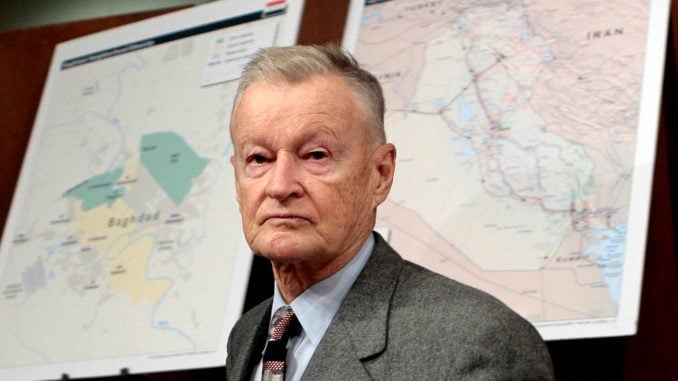
Secretary of Defense James Mattis’s reply to Steve Dickerson on CBS Face the Nation Sunday only adds to the warrior’s lore. When Mattis was asked what keeps him up at night, he immediately responded: “Nothing, I keep other people awake at night.” Mattis confidently stressed that the war against the Islamic State is shifting to annihilation tactics, reminding the nation again that the key to a strong defense is often offensive in nature.Another important American leader who reflected that mindset, especially against the former Soviet Union, was former National Security Adviser Zbigniew Brzezinski. At 89, Brzezinski passed away Friday in the country he became a citizen of 30 years after his birth. His family fled Poland before World War II, and the Soviet takeover after the war nixed the possibility of a return.Brzezinski was a bright spot in the otherwise aimless and ineffectual Jimmy Carter administration of the late 1970s and 1980. An intellectual and academic, Brzezinski was an expert on the Soviet Union, refusing to believe the “Evil Empire” was a permanent fixture on the world stage. A critic of détente, Brzezinski and global events prodded by Soviet aggression began to shift the debate on American foreign policy from containment to rollback, particularly in Eastern Europe. Before that, especially under Richard Nixon and Gerald Ford, permanent stalemate and arms treaties was all the rage amongst America’s diplomats.Brzezinski was attacked by the doves in the Carter administration and many of their cheerleaders in the media who fretted about any attempt to poke the Russian Bear. One of Brzezinski’s key contributions, and an area where Carter himself deserves some credit, was raising the moral and human rights argument against Soviet brutality. “By emphasizing human rights America could make itself the carrier of human hope, the wave of the future,” he noted. This was especially invigorating for the religious dissidents and political prisoners who were locked away and allowed to languish.Being Polish naturally instilled in Brzezinski a heart for the tens of millions of Poles suffering under Soviet occupation. He boosted Radio Free Europe’s signal strength across Eastern Europe and helped lay the external support for Polish Solidiarity, the infamous labor union that resisted and then heroically toppled their communist occupiers. After Carter’s defeat, he consulted on Ronald Reagan and former CIA Director William Casey’s covert strategy in the ramp-up of Solidarity, where it flourished under Reagan’s more aggressive posture to destabilize the Soviet stranglehold over Poland. “This was the first time that communist police suppression didn’t succeed,” Brzezinski declared.When the Soviets invaded Afghanistian, Brzezinski’s more hardline stance against the totalitarian regime was vindicated to the chagrin of the political left. Carter began to listen more to Brzezinski and was forced to take a harder stand against the Soviet menace. Brzenzinski argued for and succeeded in implementing an arms buildup, aggressive military excercises increased, as well as economic sanctions. He armed the Mujahadeen rebels in Afghanistan and helped to essentially manufacture a Vietnam quagmire for an increasingly unstable and erratic Soviet Empire.While Reagan deserves the bulk of the foreign policy credit for his aggressive rollback of containment that accelerated the Soviet demise, Brzezinski helped to lay that foundation.”Brzezinski’s brilliant strategic mind enriched American foreign policy for decades his distinctive voice will be greatly missed,” noted former Vice President Joe Biden. While he was a fixture of the Democratic Party, Brzezinski showed his bipartisan chops when he endorsed George H.W. Bush for president in 1988.He made plenty of mistakes, especially in regards to Iran and Cambodia, but his life and legacy deserves recognition, especially among the political right. He was a realist and voice of reason in the Carter administration and was critical of misguided wars, arguing there is no external cure for an unhealthy or fractured nation. As the war with the Islamic State and evil continues to rage, Brzezinski’s example remains invaluable for Americans.Ray Nothstine is a member of the North State Journal’s editorial board, separate from the news staff. Unlike other newspapers, the North State Journal does not publish unsigned editorials; the author or authors of every editorial, letter, op-ed, and column is prominently displayed. To submit a letter or op-ed, see our submission guidelines.



